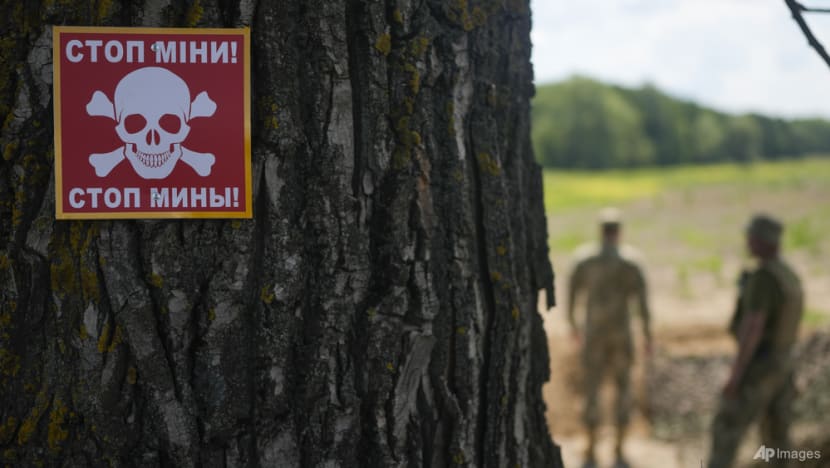Which countries are quitting a key landmine treaty and why?

A notice warning about land mines is attached to a tree as a Ukrainian specialised team searches for mines in a field in the outskirts of Kyiv, Ukraine, on Jun 9, 2022. (File photo: AP/Natacha Pisarenko)
GENEVA: Ukraine has joined other countries bordering Russia in signalling that it will withdraw from the Ottawa Convention banning anti-personnel landmines, in the face of what they say are growing military threats from Russia.
NATO members Finland, Poland and the three ex-Soviet Baltic states - Estonia, Latvia and Lithuania - have either withdrawn from the convention or indicated that they would do so, citing the increased military danger from their neighbour.
The moves threaten to reverse decades of campaigning by activists who say there should be a global ban on a weapon that blights huge swathes of territory and maims and kills civilians long after conflicts have abated.
Countries that quit the 1997 treaty, one of a series of international agreements concluded after the end of the Cold War to encourage global disarmament, will be able to start producing, using, stockpiling and transferring landmines once again.
COUNTRIES EXITING
All European countries bordering Russia have announced plans to quit the global treaty, apart from Norway, which has only a 200km border with Russia in its remote Arctic far north, and said it was important to maintain stigma around landmines.
Ukraine's President Volodymyr Zelenskyy said on Sunday (Jun 29) that he had signed a decree to pull Ukraine out of the Convention because Russia has used anti-personnel mines extensively in parts of Ukraine during the 40-month-old war.
Anti-personnel mines, Zelenskyy said, are "often the instrument for which nothing can be substituted for defence purposes".
Some European countries have said they fear that Russia could use any pause in fighting to re-arm and target them.
Officials have suggested a withdrawal could put them on more of an equal footing with Russia, which has not signed or ratified the treaty. Other major powers that have not signed include the United States and China.
In mid-June, United Nations Secretary General Antonio Guterres raised grave concerns about recent withdrawal announcements and urged all states to adhere to existing treaties and immediately halt any steps towards their withdrawal.
Also read:
FUNDING CUTS
As countries quit the convention, global demining efforts are also backsliding amid "crippling" US funding cuts under President Donald Trump, according to the International Campaign to Ban Landmines. Washington had provided more than US$300 million a year, or 40 per cent of total international support for removing mines, according to the Landmine Monitor report in 2024.
A State Department official said in March it had restarted some global humanitarian demining programmes and activities, without giving details. It has previously run major programmes in Iraq, Afghanistan and Laos.
Anti-personnel landmines are generally hidden in the ground and designed to detonate automatically when someone steps on them or passes nearby. More than 80 per cent of mine victims are civilians, according to the International Committee of the Red Cross.
The convention includes provisions to assist victims, many of whom have lost limbs and suffer from other permanent disabilities.
In June 2025, the UN reported that Ukraine had become the most mined country in the world. It said there had been around 800 civilian casualties due to unexploded ordnance.














